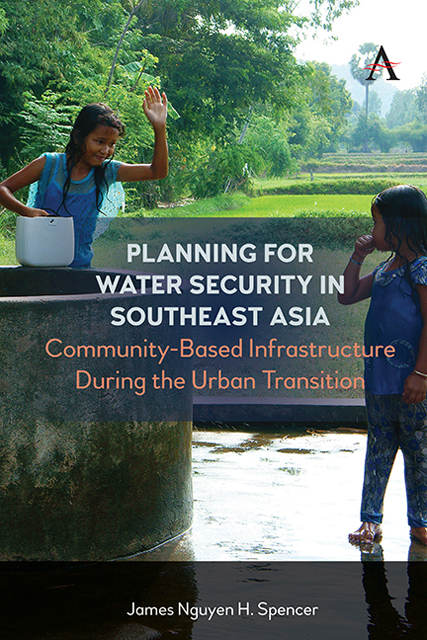 Planning for Water Security in Southeast Asia
Planning for Water Security in Southeast Asia Book contents
- Frontmatter
- Content
- Preface
- Introduction
- 1 Water and Human Security
- 2 Global Urbanization: The Confluence of Peri-Urbanization and Urban Transition
- 3 Community-Based Public Finance of Deep Well Water Systems in Peri-Urban Java
- 4 The Peri-Urbanization of Can Tho and the rise of Entrepreneurial Water Suppliers in the Mekong Delta
- 5 Ha Noi: Bulk Water Retailing in Peri-Urban Areas
- 6 Peri-Urbanization, Co-Production and Institutional Culture: The Case of the Phnom Penh Water Supply Authority
- 7 Beyond Resilience: Are we thinking about Entitlements, Participation and Governance in the Right Way?
- References
- Index
Introduction
Published online by Cambridge University Press: 10 January 2023
- Frontmatter
- Content
- Preface
- Introduction
- 1 Water and Human Security
- 2 Global Urbanization: The Confluence of Peri-Urbanization and Urban Transition
- 3 Community-Based Public Finance of Deep Well Water Systems in Peri-Urban Java
- 4 The Peri-Urbanization of Can Tho and the rise of Entrepreneurial Water Suppliers in the Mekong Delta
- 5 Ha Noi: Bulk Water Retailing in Peri-Urban Areas
- 6 Peri-Urbanization, Co-Production and Institutional Culture: The Case of the Phnom Penh Water Supply Authority
- 7 Beyond Resilience: Are we thinking about Entitlements, Participation and Governance in the Right Way?
- References
- Index
Summary
Sometimes need is—indeed—the mother of invention; sometimes, remarkable individuals and institutions can creatively solve community-level problems in the face of extreme political and financial constraints. This book is about such experiments in local governance resulting from the growing demands created by rapid urbanization. In writing about them in comparative context, I aim to shed light on some of the inner workings of local leadership in public and community sectors in ways that improve our understanding of how the practice of development is unfolding across a wide range of countries, predominantly in the Global South.
By now, it is common parlance to think of the development states of Asia and elsewhere as national behemoths implementing various versions of Modernist projects such as those detailed by Jim Scott (1998), whose version posits an ever-increasing exercise of state authority over the daily lives of citizens. Counterposed to such descriptions of strong development states are extensive descriptions of elaborate networks of informal and non-state-sanctioned community groups seeking grassroots decision-making authority. Concurrent with these two streams of thinking, involving state and non-state political actors, are the more formulaic development economics approaches whereby investments in capital result in the rewards of economic development, as has long been articulated by practitioners of development wishing to downplay the political aspects of their work.
Without undervaluing these precedents, this book navigates waters in which local governing bodies mitigate powerful nation-states—waters in which community activists channel their organizing capacities into urban infrastructure projects and in which community organizations model non-traditional development finance mechanisms. In charting this route, the book borrows perspectives and methods from each vantage point as a way to show how local government actors are not only providing a range of development alternatives but also managing new forms of public participation amidst rapidly changing local societies and politics.
Where these local arrangements come into play before a national development state creates large infrastructure systems to respond to urbanization needs, sociopolitical structures become embedded within daily practice and sometimes form the basis for a participatory version of self-governance. It is my argument that these kinds of arrangements should be seen as the seeds of a resilient form of governance in a rapidly urbanizing and developing global context.
- Type
- Chapter
- Information
- Planning for Water Security in Southeast AsiaCommunity-Based Infrastructure During the Urban Transition, pp. 1 - 24Publisher: Anthem PressPrint publication year: 2022
